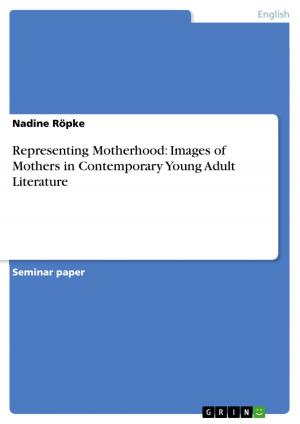The effect of the German separation on the communication in Germany
Business & Finance, Industries & Professions, Hospitality, Tourism & Travel| Author: | J. Tucholka, Anna / Wanke, C. / Schaffner | ISBN: | 9783638630757 |
| Publisher: | GRIN Publishing | Publication: | March 28, 2007 |
| Imprint: | GRIN Publishing | Language: | English |
| Author: | J. Tucholka, Anna / Wanke, C. / Schaffner |
| ISBN: | 9783638630757 |
| Publisher: | GRIN Publishing |
| Publication: | March 28, 2007 |
| Imprint: | GRIN Publishing |
| Language: | English |
Seminar paper from the year 2007 in the subject Tourism, grade: 1,7, Stralsund University of Applied Sciences, course: Intercultural communication, 15 entries in the bibliography, language: English, abstract: Communication is everything. Nowadays communication is involved in every part of our life. Interactions and interrelations between different people is the basis for social competences, politics, economy, education and many things more. Since we live in a global world we always have to deal with lots of different cultures. And every culture has its own understanding of communication, does use different communication systems. Above that every single human being of a cultural system has its own personality and values. We need a common basis where we can establish competent behaviour. We have to have a look at the collusion to avoid irritations and misunderstandings. Normally intercultural communication deals with differences/ problems between members of different cultures. But this aspect can be transmitted to the communication within one country. A special part of this topic is the situation in Germany under the aspect of communication and cultural differences. Germany has a special position in Europe caused by its history. The separation between East and West is still a topic to refer to. The collusion and the similarities are partially smaller than expected after 16 years of the reunification. In the following essay different aspects of communication and intercultural behaviour shall be applied to Germany's current situation. Reasons and possible explanations are given and in the end Germany's real position is identified and proposals for solution of still existing problems are given. All the information given are based on general scientific methods and ideas concerning communication and culture as well as on personal experiences and a survey implemented by the authors of this essay. The meaning of culture is higher than normally thought. We need 'bridges for understanding', as Richard von Weizsäcker mentioned it in his book of the same name. This concerns not only peoples from all over the world but also the inhabitants of Germany. Only by understanding the culture and the way of communication of his neighbour one is able to create harmony, freedom and liberty.
Seminar paper from the year 2007 in the subject Tourism, grade: 1,7, Stralsund University of Applied Sciences, course: Intercultural communication, 15 entries in the bibliography, language: English, abstract: Communication is everything. Nowadays communication is involved in every part of our life. Interactions and interrelations between different people is the basis for social competences, politics, economy, education and many things more. Since we live in a global world we always have to deal with lots of different cultures. And every culture has its own understanding of communication, does use different communication systems. Above that every single human being of a cultural system has its own personality and values. We need a common basis where we can establish competent behaviour. We have to have a look at the collusion to avoid irritations and misunderstandings. Normally intercultural communication deals with differences/ problems between members of different cultures. But this aspect can be transmitted to the communication within one country. A special part of this topic is the situation in Germany under the aspect of communication and cultural differences. Germany has a special position in Europe caused by its history. The separation between East and West is still a topic to refer to. The collusion and the similarities are partially smaller than expected after 16 years of the reunification. In the following essay different aspects of communication and intercultural behaviour shall be applied to Germany's current situation. Reasons and possible explanations are given and in the end Germany's real position is identified and proposals for solution of still existing problems are given. All the information given are based on general scientific methods and ideas concerning communication and culture as well as on personal experiences and a survey implemented by the authors of this essay. The meaning of culture is higher than normally thought. We need 'bridges for understanding', as Richard von Weizsäcker mentioned it in his book of the same name. This concerns not only peoples from all over the world but also the inhabitants of Germany. Only by understanding the culture and the way of communication of his neighbour one is able to create harmony, freedom and liberty.















